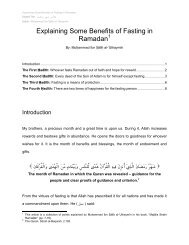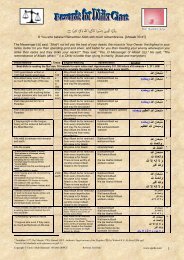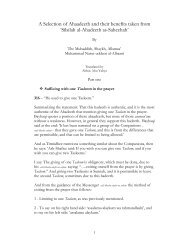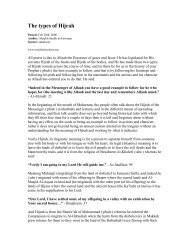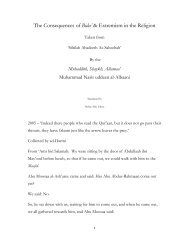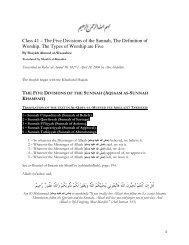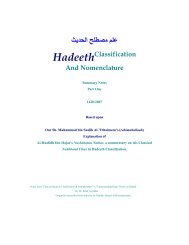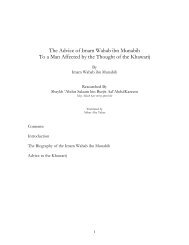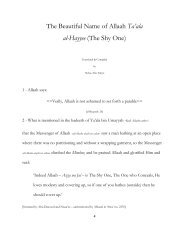Class 21 â A Summary of Ash-Shirk, A Summary of ... - Abdurrahman
Class 21 â A Summary of Ash-Shirk, A Summary of ... - Abdurrahman
Class 21 â A Summary of Ash-Shirk, A Summary of ... - Abdurrahman
You also want an ePaper? Increase the reach of your titles
YUMPU automatically turns print PDFs into web optimized ePapers that Google loves.
<strong>Class</strong> <strong>21</strong> – A <strong>Summary</strong> <strong>of</strong> <strong>Ash</strong>-<strong>Shirk</strong>, A <strong>Summary</strong> <strong>of</strong> Al-Kufr, TheKuffaar Are <strong>of</strong> Two TypesBy Shaykh Ahmed al-WasaabeeTranslated by Shaakir al-KanadeeTranscribed on Sha’baan 4, 1426 / September 8, 2005 by Abu Abdullah.The shaykh began with the Khutbatul Haajah.Question:We have the 8 th Edition <strong>of</strong> the ‘Arabic book Al-Qawl-ul-Mufeed Fee Adillatit Tawheed. However,we only have only copy. So is permissible for us to photocopy the book and distribute it for thepurposes <strong>of</strong> this class?Answer:The shaykh said that we have permission to copy the book Al-Qawl-ul-Mufeed Fee AdillatitTawheed and distribute it amongst the students <strong>of</strong> Toronto who are participating in the class. Andthere is no problem with this.A SUMMARY OF ASH-SHIRKTRANSLATION OF THE TEXT IN AL-QAWL-UL-MUFEED FEE ADILLATIT TAWHEED:<strong>Shirk</strong> is <strong>of</strong> two types, major (Akbar) and minor (Asghar):So major shirk (ash-<strong>Shirk</strong> al-Akbar) is that which expels one from the religion, and minor shirk (ash-<strong>Shirk</strong> al-Asghar) does not expel one from the religion, but it is the greatest <strong>of</strong> all the major sins.So from ash-<strong>Shirk</strong> al-Akbar: The slaughtering for other than Allaah, and vowing to other thanAllaah, and supplicating to other than Allaah, and prostration to other than Allaah, and other thanthese.And from ash-<strong>Shirk</strong> al-Asghar: Ar-riyaa’ (showing <strong>of</strong>f), and swearing for other than Allaahwithout reaching the level <strong>of</strong> worship, and the statement: “I have no one except Allaah and you,”and “I trust upon Allaah and you,” and other than these.And a reminder and notification: Ar-riyaa’ (showing <strong>of</strong>f) can be from ash-<strong>Shirk</strong> al-Akbar if aperson performs an action only for the people. And it can be from ash-<strong>Shirk</strong> al-Asghar if a personstarts with the right intention, but then ar-riyaa’ overcomes him.1
Refer to Fataawaa al-Lajnah ad-Daaimah, Volume 1.EXPLANATION OF THE TEXT BY SHAYKH AL-WASAABEE:So for example if a person gives in charity, and his only intent is to show <strong>of</strong>f to the people, and to beheard about amongst the people, and he does not seek in any way the pleasure <strong>of</strong> Allaah, so does itpurely and solely for the people, then this is ash-<strong>Shirk</strong> al-Akbar. This is because he is worshippingthe creation and not worshipping Allaah (subhaana wa ta’laa).Allaah (subhaana wa ta’laa) says in reference to the Ahlul-Kitaab (People <strong>of</strong> the Book): Think not that those who rejoice in what they have done (or brought about), and love to be praised for what they havenot done, think not you that they are rescued from the torment, and for them is a painful torment. (Aali Imran3:188)And as for ar-riyaa’ which comes under ash-<strong>Shirk</strong> al-Asghar, it is when a person while performinghis worship with a sincere intention, solely for the sake <strong>of</strong> Allaah (subhaana wa ta’laa), not seekingany <strong>of</strong> the creation in his worship, is overcome by ar-riyaa’, which is the intention to show <strong>of</strong>f, or tobe heard about, or to be seen. So upon this person is to strive hard and to struggle in returning hisintention back to being purely and solely for Allaah (subhaana wa ta’laa) and to seek His pleasureonly. Allaah’s statement: As for those who strive hard in Us (Our Cause), We will surely guide them to Our Paths (i.e. Allâh's Religion -Islâmic Monotheism). (Al-'Ankabut 29:69)And if a person, while praying alone by himself, prays in deficiency, however, when he prays withthe people, he prays in perfection, then this is a type <strong>of</strong> minor shirk that falls under ar-riyaa’. And if aperson were to give in charity, and he made up his mind about giving a certain amount, but when hecomes amidst the people, he gives a larger amount, then this also is a form <strong>of</strong> ar-riyaa’ which fallsunder ash-<strong>Shirk</strong> al-Asghar.And it is upon a person who is overcome by ar-riyaa’ (after having a pure and sincere intention) tostrive hard and struggle in returning and fixing his intention so that he seeks the pleasure <strong>of</strong> Allaah(subhaana wa ta’laa) only. And if a person is overcome by ar-riyaa’ during his worship, then thisshould not be a reason for him to abandon that particular worship. But rather, he should continueon with his worship and strive hard and struggle in fixing his intention and returning it back to alikhlaas.An example is that <strong>of</strong> a khateeb, who while giving the khutbah on Yawm al-Jumu’ah, is putto trial by the whisperings <strong>of</strong> the shaytaan, that “you are the most knowledgeable,” and that “you arethe one with the most eloquent speech and who has memorized the most.” However, this should2
not be a reason for him to stop giving the khutbah. Rather, he is to fight and struggle in warding <strong>of</strong>fthis intention <strong>of</strong> ar-riyaa’, and struggle hard in returning his intention back for the sole pleasure <strong>of</strong>Allaah (subhaana wa ta’laa).A SUMMARY OF AL-KUFRTRANSLATION OF THE TEXT IN AL-QAWL-UL-MUFEED FEE ADILLATIT TAWHEED:Kufr is <strong>of</strong> two types:1. Akbar (the Major)2. Asghar (the Minor)And if you wish then say:1. Expels one from the religion2. Does not expel from the religionSo as for al-Kufr al-Akbar, and it is that which expels one from the religion, its types are:1. Kufr <strong>of</strong> Denial [Kufr ut-Takdheeb]2. Kufr <strong>of</strong> Deviation [Kufr al-Ilhaad]3. Kufr <strong>of</strong> Unbelief (denial after conviction <strong>of</strong> the truth) [Kufr ul-Juhood]4. Kufr <strong>of</strong> Association [Kufr ush-<strong>Shirk</strong>]5. Kufr <strong>of</strong> Rejection [Kufr ul-Inkaar]6. Kufr <strong>of</strong> Doubt [Kufr ush-Shakk]7. Kufr <strong>of</strong> Mockery [Kufr ul-Istihzaa’ was-Sakhreeyah]8. Kufr <strong>of</strong> Avoidance [Kufr ul-I’raad]9. Kufr <strong>of</strong> Pridefulness and Rejection [Kufr al-Ibaa’ wal-Istakbaar]10. Kufr <strong>of</strong> Hypocrisy [Kufr un-Nifaaq]11. Kufr <strong>of</strong> Opposition [Kufr al-‘Inaad]12. Kufr <strong>of</strong> Heresy [Kufr uz-Zandaqah]. Refer to Sharh At-Tahaaweeyah, Page 342.13. Kufr <strong>of</strong> Companionship to the enemies <strong>of</strong> Islaam [Kufr ul-Muwaalah li-‘Adaail Islaam]14. Kufr <strong>of</strong> Apostasy [Kufr ur-Riddah]15. Kufr <strong>of</strong> Astrology and Magic [Kufr al-Munajimeen was-Saharah]. Refer to Madaarij as-Saalikeen, 1/337.16. Kufr <strong>of</strong> those who attest to the truthfulness <strong>of</strong> the astrologers and the claimants to theknowledge <strong>of</strong> the unseen [Kufr man yasdaq al-Munajimeen wal-Kahaan]. Refer to Fataawaaal-Lajnah ad-Daaimah, 1/412.And as for al-Kufr al-Asghar, it is that which does not expel from the religion, and its types are:1. Kufr <strong>of</strong> Blessing (Kufr un-Ni’mah]2. Kufr <strong>of</strong> Brotherhood [Kufr ul-‘Ikhoowah]3. Kufr <strong>of</strong> Family Relationships [Kufr ul-‘<strong>Ash</strong>rah]4. Kufr <strong>of</strong> Slandering in Kinship [Kufr ut-T’an fil ‘Ansaab]5. Kufr <strong>of</strong> Mourning Over the Dead [Kufr ul-Niyaahah ‘alal Mait]3
6. Kufr <strong>of</strong> Denial <strong>of</strong> Father’s Lineage [Kufr ur-Raghbah ‘an al-Abu]EXPLANATION OF THE TEXT BY SHAYKH AL-WASAABEE:The first type <strong>of</strong> kufr, which is al-Kufr al-Akbar, is disbelief in Allaah and His Messenger, and it isthe disbelief that takes one outside <strong>of</strong> the fold <strong>of</strong> al-Islaam. As for a person who believes in theOneness <strong>of</strong> Allaah and believes in the Prophets, but he does not believe in our Prophet (statement: then he is outside <strong>of</strong> the fold <strong>of</strong> al-Islaam with al-Kufr al-Akbar. Allaah’s ,(وسلمصلى االله عليه Say (O Muhammad ()): "We believe in Allâh and in what has been sent down to us, and what wassent down to Ibrâhim (Abraham), Ismâ'il (Ishmael), Ishâque (Isaac), Ya'qûb (Jacob) and Al-Asbât [the twelve sons<strong>of</strong> Ya'qûb (Jacob)] and what was given to Mûsa (Moses), 'Iesa (Jesus) and the Prophets from their Lord. We makeno distinction between one another among them and to Him (Allâh) we have submitted (in Islâm)." (Aali Imran3:84)صلى االله عليه وسلمAnd an example <strong>of</strong> the second type <strong>of</strong> kufr, which is al-Kufr al-Asghar, is to swear to other thanAllaah (subhaana wa ta’laa). This is so long as it is not accompanied by glorification <strong>of</strong> that whichwas sweared for (other than Allaah).In explanation <strong>of</strong> the types <strong>of</strong> Major Kufr:1. Kufr <strong>of</strong> Denial [Kufr ut-Takdheeb] – And from it is to deny some <strong>of</strong> the Messengers and todisbelieve in them. Allaah’s statement: Verily, those who disbelieve in Allâh and His Messengers and wish to make distinction between Allâh andHis Messengers (by believing in Allâh and disbelieving in His Messengers) saying, "We believe in some butreject others," and wish to adopt a way in between. (An-Nisa 4:150) They are in truth disbelievers. (An-Nisa 4:151)And Abu Jahl and his people, they also denied the Prophet () and the messagethat he came with, and they called him a liar. This is an example <strong>of</strong> Kufr <strong>of</strong> Denial.صلى االله عليه وسلم4
And the people <strong>of</strong> Quraysh also denied and disbelieved in the Prophet () whenhe informed them about his journey to Bayt al-Maqdis in Jerusalem and then his ascensionto the Seven Heavens, as occurs in the following hadeeth:صلى االله عليه وسلمJaabir ibn ‘Abdullaah narrated that he heard Allah’s Messenger saying, “When the people <strong>of</strong> Quraysh didnot believe me (i.e. the story <strong>of</strong> my Night Journey), I stood up in Al-Hijr [a part <strong>of</strong> the Ka’bah] and Allahdisplayed Jerusalem in front <strong>of</strong> me, and I began describing it to them while I was looking at it.”(Bukhaaree,no. 3625).And Abu Bakr as-Siddeeq (radiyAllaahu ‘anhu) believed in the Prophet and attested that heis truthful when he was told about this, while the Quraysh denied him.2. Kufr <strong>of</strong> Deviation [Kufr al-Ilhaad] - Such as deviation in the existence and Lordship <strong>of</strong>Allaah. Examples are those who say that the creation is controlled and regulated by “mothernature,” or that the origin <strong>of</strong> humankind is from apes.3. Kufr <strong>of</strong> Unbelief (denial after conviction <strong>of</strong> the truth) [Kufr ul-Juhood] - This is also denial<strong>of</strong> the existence <strong>of</strong> Allaah (subhaana wa ta’laa), or denial <strong>of</strong> any <strong>of</strong> the Messengers <strong>of</strong> Allaah(subhaana wa ta’laa) and what was sent with them. Allaah’s statement in reference to Firawnand his people: Then after them We sent Mûsa (Moses) and Hârûn (Aaron) to Fir'aun (Pharaoh) and his chiefs with OurAyât (pro<strong>of</strong>s, evidences, verses, lessons, signs, revelations, etc.). But they behaved arrogantly and wereMujrimûn (disbelievers, sinners, polytheists, criminals, etc.) folk. (Yunus 10:75)This is a pro<strong>of</strong> that Kufr ul-Juhood is denial after having conviction <strong>of</strong> the truth (such wasthe case <strong>of</strong> Firawn).4. Kufr <strong>of</strong> Association [Kufr ush-<strong>Shirk</strong>] – And the pro<strong>of</strong>s for this type <strong>of</strong> Kufr al-Akbar haspreceded in previous lessons.5. Kufr <strong>of</strong> Rejection [Kufr ul-Inkaar] – This occurs when there is denial while not knowing thetruth <strong>of</strong> what is denied (rejecting the truth while not knowing that it is the truth).6. Kufr <strong>of</strong> Doubt [Kufr ush-Shakk] – Allaah’s statement: Only those are the believers who have believed in Allâh and His Messenger, and afterward doubt not. (Al-Hujurat 49:15)7. Kufr <strong>of</strong> Mockery [Kufr ul-Istihzaa’ was-Sakhreeyah] – Allaah’s statement:5
If you ask them (about this), they declare: "We were only talking idly and joking." Say: "Was it at Allâh,) وسلم ( Messenger and His Ayât (pro<strong>of</strong>s, evidences, verses, lessons, signs, revelations, etc.) and Histhat you were mocking?" (At-Tawbah 9:65) Make no excuse; you have disbelieved after you had believed. (At-Tawbah 9:66)صلى االله عليه8. Kufr <strong>of</strong> Avoidance [Kufr ul-I’raad] – This has also preceded us in some <strong>of</strong> the previouslessons, such as the Nullifiers <strong>of</strong> al-Islaam. This is to show aversion and turning away fromcontemplating over the signs <strong>of</strong> Allaah (subhaana wa ta’laa) which point to His Oneness andthat He is the Only One deserving <strong>of</strong> all worship.9. Kufr <strong>of</strong> Pridefulness and Rejection [Kufr al-Ibaa’ wal-Istakbaar] – And this is the disbelief <strong>of</strong>Iblees. When Allaah (subhaana wa ta’laa) created Aadam and ordered the Angels to prostrateto him, Iblees rejected out <strong>of</strong> pridefulness. Allaah’s statement: And (remember) when We said to the angels: "Prostrate yourselves before Aadam." And they prostratedexcept Iblîs (Satan), he refused and was proud and was one <strong>of</strong> the disbelievers (disobedient to Allâh). (Al-Baqarah 2:34)10. Kufr <strong>of</strong> Hypocrisy [Kufr un-Nifaaq] – And hypocrisy divides into two categories. The firstcategory being the Hypocrisy <strong>of</strong> Belief. And the second category being Hypocrisy <strong>of</strong> Action.And the intent here, the Kufr <strong>of</strong> Hypocrisy, which falls under al-Kufr al-Akbar, is theHypocrisy <strong>of</strong> Belief.11. Kufr <strong>of</strong> Opposition [Kufr al-‘Inaad] – And this is by knowing the truth, but due toopposition to it and stubbornness with regards to it, not accepting it nor believing in it.Narrated Said bin al-Musaiyab from his father, When the time <strong>of</strong> the death <strong>of</strong> abu talib approached,Allah's Apostle went to him and found Abu Jahl bin Hisham and 'Abdullah bin Abi Umaiya bin Al-Mughira by his side. Allah's Apostle said to abu talib, "O uncle! Say: None has the right to be worshippedbut Allah, a sentence with which I shall be a witness (i.e. argue) for you before Allah. Abu Jahl and'Abdullah bin Abi Umaiya said, "O abu talib! Are you going to denounce the religion <strong>of</strong> AbdulMuttalib?" Allah's Apostle kept on inviting abu talib to say it (i.e. 'None has the right to be worshippedbut Allah') while they (Abu Jahl and Abdullah) kept on repeating their statement till abu talib said as hislast statement that he was on the religion <strong>of</strong> Abdul Muttalib and refused to say, 'None has the right to beworshipped but Allah.' (Bukhaaree, no. 1280).12. Kufr <strong>of</strong> Heresy [Kufr uz-Zandaqah] – This type <strong>of</strong> disbelief is in regards to those who allegethat they are from Muslims and follow the deen <strong>of</strong> al-Islaam, such as al-Hallaaj and Ibn6
‘Arabee (al-Haatimee at-Taa’ee). Shaykhul-Islaam ibn Taymiyyah has mentioned this in hisMajmoo’ al-Fataawaa.13. Kufr <strong>of</strong> Companionship to the enemies <strong>of</strong> Islaam [Kufr ul-Muwaalah li-‘Adaail Islaam] –This is by believing that the people <strong>of</strong> kufr are upon the truth, and that their way is betterthan the way <strong>of</strong> al-Islaam. And imitating and copying the kuffaar in their clothing, and intheir affairs. Allaah’s statement: O you who believe! Take not the Jews and the Christians as Auliyâ' (friends, protectors, helpers, etc.), theyare but Auliyâ' to one another. And if any amongst you takes them as Auliyâ', then surely he is one <strong>of</strong>them.(Al-Ma'idah 5:51)So that the one who authenticate what they are upon and believe that what they are upon istrue, then has taken them as allies, so he is from them.14. Kufr <strong>of</strong> Apostasy [Kufr ur-Riddah] – This occurs when a Muslim takes on one <strong>of</strong> thenullifiers <strong>of</strong> al-Islaam, and thereby leaving the fold <strong>of</strong> al-Islaam. And his repentance issought, and if he does not repent, then he is to be killed.From Ibn Abbaas (radiyAllaahu anhumaa) who said, ‘The Prophet (changes his Religion, then kill him.’’ (Bukhaaree, no. 2854).15. Kufr <strong>of</strong> Astrology and Magic [Kufr al-Munajimeen was-Saharah].) said, ‘Whoever صلى االله عليه وسلم16. Kufr <strong>of</strong> those who attest to the truthfulness <strong>of</strong> the astrologers and the claimants to theknowledge <strong>of</strong> the unseen [Kufr man yasdaq al-Munajimeen wal-Kahaan].Shaykh Ahmed then read to us from the famous book <strong>of</strong> al-Imaam Ibnul-Qayyim(rahimahullaah), Madaarij As-Saalikeen. And in this Ibnul-Qayyim mentions the differentcategories <strong>of</strong> al-Kufr al-Akbar:“al-Kufr al-Akbar has five categories:1. Kufr <strong>of</strong> Denial [Kufr ut-Takdheeb]2. Kufr <strong>of</strong> Pridefulness and Rejection along with affirmation [Kufr al-Ibaa’ wal-Istakbaar]3. Kufr <strong>of</strong> Avoidance/Aversion [Kufr ul-I’raad]4. Kufr <strong>of</strong> Doubt [Kufr ush-Shakk]5. Kufr <strong>of</strong> Hypocrisy [Kufr un-Nifaaq]And as for the Kufr <strong>of</strong> Denial, then this is to believe that the Messengers were liars. And this type <strong>of</strong>disbelief is found in the minority amongst the kaafiroon. For Verily Allaah (subhaana wa ta’laa) hashelped His Messengers by giving them from His Signs, and has established their truthfulness, and7
has established through them His command and His ruling (subhaana wa ta’laa). And Allaah(subhaana wa ta’laa) has said: We know indeed the grief which their words cause you (O Muhammad ()): it is not you that theydeny, but it is the Verses (the Qur'ân) <strong>of</strong> Allâh that the Zâlimûn (polytheists and wrongdoers) deny. (Al-An'am6:33)صلى االله عليه وسلمAnd this type <strong>of</strong> disbelief is called Kufr ut-Takdheeb, and it is by the tongue.And the Kufr <strong>of</strong> Pridefulness and Rejection is the disbelief <strong>of</strong> Iblees. For Verily he did not deny theorder <strong>of</strong> Allaah (subhaana wa ta’laa), nor did he refuse the order <strong>of</strong> Allaah (subhaana wa ta’laa),except out <strong>of</strong> pridefulness and rejection. And from this type <strong>of</strong> disbelief is the disbelief <strong>of</strong> the onewho knows the truthfulness <strong>of</strong> the Messenger and that his message has come from Allaah, howeverhe (the prideful rejecter) does submit to it due to pridefulness and then rejects it. And this is themajority <strong>of</strong> the disbelief <strong>of</strong> the kaafiroon. Allaah’s statement: Their Messengers said: "What! Can there be a doubt about Allâh, the Creator <strong>of</strong> the heavens and the earth? He callsyou (to Monotheism and to be obedient to Allâh) that He may forgive you <strong>of</strong> your sins and give you respite for a termappointed." They said: "You are no more than human beings like us! You wish to turn us away from what ourfathers used to worship. Then bring us a clear authority i.e. a clear pro<strong>of</strong> <strong>of</strong> what you say)." (Ibrahim 14:10)And His statement: ) وسلم ( Muhammad Those to whom We have given the Scripture (Jews and Christians) recognize him (i.e.as a Messenger <strong>of</strong> Allâh, and they also know that there is no Ilah (God) but Allâh and Islâm is Allâh's Religion),as they recognize their own sons. Those who destroy themselves will not believe. (Tafsir At-Tabarî) (Al-An'am 6:20)صلى االله عليهAnd this is also the disbelief <strong>of</strong> Abu Taalib. For Verily he knew that what was sent to the Prophetis the truth, and he did not doubt in its truthfulness. However, out <strong>of</strong> his (صلى (pridefulness and his crave for his position amongst the people, and his glorification <strong>of</strong> his fathers, herejected the truth and did not submit to it.وسلم عليه االلهAnd as for Kufr <strong>of</strong> Aversion and Turning Away, then this is by turning away by ones hearing andones heart from the Messengers. And not attesting to their truthfulness and their message, nordenying them and their message (not calling him a liar). And not being an ally to him, nor an enemy8
), وسلم ( Prophet to him. This is the disbelief <strong>of</strong> one <strong>of</strong> the people <strong>of</strong> La’ab, who said to the“Verily, Allaah gave you a word. And if you are truthful, then you are more dearer to me in my heartthan what I return to you. And if you are a liar, then you are more hated by me than what I giveyou.”صلى االله عليهAnd as for Kufr <strong>of</strong> Doubt, then this is by not being certain about the truthfulness <strong>of</strong> the Prophets.It is by not making the Prophet a liar, but at the same time having doubts about his issue (the issue<strong>of</strong> the truthfulness <strong>of</strong> the Prophet (). And this state does not continue except when aperson turns away and averts from looking and contemplating over the Signs <strong>of</strong> Allaah (subhaanawa ta’laa), which establish the truth <strong>of</strong> the Prophet () in its entirety. So this person doesnot care and nor does he pay attention to it. As for the one who turns to the Signs <strong>of</strong> Allaah(subhaana wa ta’laa) and pays attention to them, then this doubt will not remain. For Verily, thiscontemplating and searching necessitates affirmation and testification.صلى االله عليه وسلمصلى االله عليه وسلمAnd as for Kufr <strong>of</strong> Hypocrisy, then this is by affirming by the tongue and disbelieving with theheart. And this is the Major Hypocrisy (Hypocrisy <strong>of</strong> Belief).And as for Kufr <strong>of</strong> Denial [Kufr ul-Juhood], then it is <strong>of</strong> two types:1. Unlimited and Stipulated Denial2. Stipulated and Specific DenialAs for Unlimited and Absolute Denial, then it is to deny in its entirety what Allaah (subhaana wata’laa) has revealed and the descending <strong>of</strong> the Messengers. And as for Stipulated and Specific Denial,then this is by denying a waajib element <strong>of</strong> the deen from amongst the waajibaat <strong>of</strong> this deen. Or bymaking that which is halaal haraam and vice versa (Istihlaal Qalbi), or by denying an Attribute whichAllaah (subhaana wa ta’laa) has described Himself with, or by denying some information and newsthat Allaah (subhaana wa ta’laa) has informed us about, doing this intentionally. And by preferringthe statements <strong>of</strong> those who go against the statements <strong>of</strong> Allaah (subhaana wa ta’laa). And for theone who does this ignorantly, or having a misunderstanding, then he is to be excused on the basis <strong>of</strong>his jahl or erroneous misunderstanding. And he does not become a kaafir due to this.And the pro<strong>of</strong> <strong>of</strong> this is the case <strong>of</strong> the man who exceeded in transgression against his own soul andwho said to his family, ‘When I die, burn me and scatter my ashes into the sea.’ He did this thinkingthat he will be saved from the punishment <strong>of</strong> Allaah by it. Then his family did what he had orderedthem. And Allaah (‘azza wa jal) gathered his ashes together and brought him back and asked him,“Why did you do it?” He replied, ‘My Lord I feared Your Punishment.’ And so Allaah forgave him.And this was because <strong>of</strong> this man’s jahl.” (Madaarij as-Salaakeen, Volume 1, Pg. 337 – 339) [End <strong>of</strong>Ibnul-Qayyim’s words].Shaykh Ahmed then continued on with the explanation <strong>of</strong> the last two remaining types <strong>of</strong> MajorKufr, which are Kufr <strong>of</strong> Astrology and Magic [Kufr al-Munajimeen was-Saharah] and Kufr <strong>of</strong> thosewho attest to the truthfulness <strong>of</strong> the astrologers and the claimants to the knowledge <strong>of</strong> the unseen[Kufr man yasdaq al-Munajimeen wal-Kahaan]. And the astrologers and magicians and disbelieversbecause they claim that they possess the knowledge <strong>of</strong> the unseen. And the knowledge <strong>of</strong> the unseenis possessed only by Allaah (subhaana wa ta’laa). And the ones who affirm and testify to what theastrologers and the claimants to the knowledge <strong>of</strong> the unseen say are also disbelievers.9
The Prophet () said, “Whoever goes to the one who claims to have knowledge <strong>of</strong> the unseen, and thenصلى االله عليه ( Muhammad guarantees and affirms what he has said, then he has disbelieved in what has descended uponوسلم االله عليه صلى”.(وسلمTherefore, it is not allowable for people to go to those who claim to have knowledge <strong>of</strong> the unseenfor any reason or purpose. The shaykh mentioned the story <strong>of</strong> Ibn Fayyaad, who was a young Jewishman, and the Prophet () went to him to check out his condition, believing that he wasthe dajjaal. So drawing a similitude, Shaykh Ahmed mentioned that going to the people who claim tohave knowledge <strong>of</strong> the unseen, from amongst the astrologers and the sorcerers, in order to clarifytheir situation and to warn the people from them, that this is permissible to do this if a person hasthe ability to do so. This is in order to expose their condition to the people, and to expose that theydelve in the knowledge <strong>of</strong> the unseen. The pro<strong>of</strong> for this is the following hadeeth:صلى االله عليه وسلم) وسلم ( Allaah From Abu Sa’eed al-Khudree (radiyAllaahu anhu) who said, “I heard the Messenger <strong>of</strong>say, “Whoever from you sees an evil then let him change it with his hand and if he is not able to, then with his tongueand if he is not able to do that, then with his heart (i.e. hate it in his heart) and that is the weakest <strong>of</strong> Eemaan.””(Muslim, Kitaab-ul-Eemaan, Chapter 20-1/69).In explanation <strong>of</strong> the types <strong>of</strong> Minor Kufr:صلى االله عليه1. Kufr <strong>of</strong> Blessing (Kufr un-Ni’mah] – This is by denying the bounties <strong>of</strong> Allaah and notbeing thankful to Him for the numerous bounties He has given us. Allaah (subhaana wata’laa) says: And whatever <strong>of</strong> blessings and good things you have, it is from Allâh. (An-Nahl 16:53)And Allaah says: And if you count the Blessings <strong>of</strong> Allâh, never will you be able to count them. (Ibrahim 14:34)And when a person is thankful to Allaah (subhaana wa ta’laa) for the bounties that He hasgiven him, then this is a cause and a reason for Allaah (subhaana wa ta’laa) to increase Hisbounties for this person. Allaah says in the Qur’aan: And He answers (the invocation <strong>of</strong>) those who believe (in the Oneness <strong>of</strong> Allâh Islâmic Monotheism) and dorighteous good deeds, and gives them increase <strong>of</strong> His Bounty. And as for the disbelievers, theirs will be asevere torment. (<strong>Ash</strong>-Shura 42:26)2. Kufr <strong>of</strong> Brotherhood [Kufr ul-‘Ikhoowah] – Allaah (subhaana wa ta’laa) says:10
The believers are nothing else than brothers (in Islâmic religion). (Al-Hujurat 49:10)And Allaah’s statement: And remember Allâh's Favour on you, for you were enemies one to another but He joined your heartstogether, so that, by His Grace, you became brethren (in Islâmic Faith). (Aali Imran 3:103)3. Kufr <strong>of</strong> Family Relationships [Kufr ul-‘<strong>Ash</strong>rah] – An example <strong>of</strong> this is the hadeeth:Narrated Ibn ‘Abbaas that the Prophet said: "I was shown the Hell-fire and that the majority <strong>of</strong> its dwellerswere women who were ungrateful." It was asked, "Do they disbelieve in Allah?" (or are they ungrateful toAllah?) He replied, "They are ungrateful to their husbands and are ungrateful for the favours and the good(charitable deeds) done to them. If you have always been good (benevolent) to one <strong>of</strong> them and then she seessomething in you (not <strong>of</strong> her liking), she will say, 'I have never received any good from you." (Bukhaaree, no.28).So this woman has the disbelief <strong>of</strong> family relationships.And all these categories <strong>of</strong> disbelief do not take a person outside <strong>of</strong> the fold <strong>of</strong> al-Islaam.However, it is mandatory for a person to make repentance from them.4. Kufr <strong>of</strong> Slandering in Kinship/Lineage [Kufr ut-T’an fil ‘Ansaab] – This is by feeling proud<strong>of</strong> ones high lineage, or belittling a person’s not so high lineage. Allaah’s statement: Verily, the most honourable <strong>of</strong> you with Allâh is that (believer) who has At-Taqwa (Al-Hujurat 49:13)5. Kufr <strong>of</strong> Mourning Over the Dead [Kufr ul-Niyaahah ‘alal Mait] –Narrated Ibn ‘Umar that the Prophet (lamenting <strong>of</strong> his family for him.” (Muslim, no. 2023).) said, “The dead is punished because <strong>of</strong> the صلى االله عليه وسلم6. Kufr <strong>of</strong> Denial <strong>of</strong> Father’s Lineage [Kufr ur-Raghbah ‘an al-Abu] – From this is a personwho assuming that his father has a low lineage denies his lineage to him, and claims that hislineage is <strong>of</strong> a higher rank. And also included in this category are those who are from aparticular tribe, which may be weak or <strong>of</strong> a low status, but they attribute themselves toanother tribe who is <strong>of</strong> a higher status and rank.11
These are all categories <strong>of</strong> Minor Kufr that necessitate that a person make repentance from them,and it is necessary to leave <strong>of</strong>f these actions. And this disbelief does not take a person outside <strong>of</strong> thefold <strong>of</strong> al-Islaam.THE KUFFAAR ARE OF TWO TYPESTRANSLATION OF THE TEXT IN AL-QAWL-UL-MUFEED FEE ADILLATIT TAWHEED:1. Original Disbelievers (Kuffaar Asliyoon)2. Reverted Disbelievers / Apostates (Kuffaar Murtadoon)The Kuffaar have another division:The Kuffaar are also another two types:1. Kuffaar who call to Kufr.2. Kuffaar who blindly follow.Benefit: al-‘Allaamah Ibnul-Qayyim (rahimahullaah) said:“So as for disbelief, then it is two types: Kufr Akbar (Major Disbelief), and Kufr Asghar (MinorKufr).And as for Kufr Akbar: It necessitates eternal dwelling in the Fire.And as for Asghar: It necessities the receiving <strong>of</strong> the promised punishment without eternaldwelling.”Refer to Madaarij as-Saalikeen: 1/364.EXPLANATION OF THE TEXT BY SHAYKH AL-WASAABEE:This chapter is basic and straightforward, and therefore there is not much need in explaining it. Inreference to the two types <strong>of</strong> kuffaar, kuffaar asliyoon, and they are the ones who are brought up asdisbelievers by their parents, and kuffaar murtadoon, and included amongst these are the ones whowere brought up as Muslims and then apostated or embraced al-Islaam (after initially being broughtup as disbelievers), and then left the fold <strong>of</strong> al-Islaam again.Explaining the other division <strong>of</strong> disbelievers, the kuffaar who call to kufr, and they are the ones whobeautify kufr to the people, and they falsely portray to the people that kufr is al-haqq. And the othercategory is the kuffaar who blindly follow, and they are the ones who called to kufr.And the ruling on the apostate is that his repentance is to be sought, and if he does not repent, thenhe is to be killed.12
From Abdullaah ibn Mas’ood (radiyAllaahu anhu) who said, ‘The Messenger <strong>of</strong> Allaah () said,‘The blood <strong>of</strong> a Muslim is not lawful who testifies that there is no deity worthy <strong>of</strong> worship besides Allaah and that Iam the Messenger <strong>of</strong> Allaah, except by one <strong>of</strong> three things: a married woman who commits fornication, a life for a life,and one who leaves his Religion and separates from the Jamaa’ah (main body <strong>of</strong> Muslims).’’ (Bukhaaree, no. 6484and Muslim, no. 1676).وسلم االله عليه صلىAnd also, from Ibn Abbaas (radiyAllaahu anhumaa) who said, ‘The Prophet (changes his Religion, then kill him.’’ (Bukhaaree, no. 2854).) said, ‘Whoever صلى االله عليه وسلمQ&A1. What is the ruling on the one who commits ash-<strong>Shirk</strong> al-Akbar out <strong>of</strong> ignorance?Ans:<strong>Shirk</strong> is the most greatest <strong>of</strong> the major sins. And it is the biggest sin that Allaah (subhaana wata’laa) is disobeyed with. Allaah’s statement: It is those who believe (in the Oneness <strong>of</strong> Allâh and worship none but Him Alone) and confuse not theirbelief with Zulm (wrong i.e. by worshipping others besides Allâh), for them (only) there is security and theyare the guided. (Al-An'am 6:82)It is narrated on the authority <strong>of</strong> 'Abdullaah (ibn Mas'ood) that when this verse was revealed:" It is thosewho believe and confound not their belief with wrongdoing," the Companions <strong>of</strong> the Messenger <strong>of</strong> Allaah woregreatly perturbed. They said: “Who amongst us (is so fortunate) that he does not wrong himself?” Upon thisthe Messenger <strong>of</strong> Allaah () remarked: “It does not mean that which you presume. It impliesthat which Luqmaan said to his son: ‘O my son, do not associate anything with Allaah, for indeed it is thegravest wrongdoing.’” (Luqmaan 31:13).صلى االله عليه وسلمIt is upon those who commit acts <strong>of</strong> major shirk and kufr to make repentance to Allaah(subhaana wa ta’laa). Allaah says: And those who, when they have committed Fahishah (illegal sexual intercourse etc.) or wronged themselveswith evil, remember Allâh and ask forgiveness for their sins; - and none can forgive sins but Allâh - And donot persist in what (wrong) they have done, while they know. (Aali Imran 3:135)So it is upon a servant to make haste in making repentance to Allaah (subhaana wa ta’laa).Allaah’s statement:13
Say: "O 'Ibâdî (My slaves) who have transgressed against themselves (by committing evil deeds and sins)!Despair not <strong>of</strong> the Mercy <strong>of</strong> Allâh, verily Allâh forgives all sins. Truly, He is Oft-Forgiving, Most Merciful.(Az-Zumar 39:53)And the doors <strong>of</strong> tawbah do not close until the rising <strong>of</strong> the sun from the west. And thedoors <strong>of</strong> tawbah are open for a person until his last breathes, until the coming out <strong>of</strong> hissoul. And if a person makes sincere tawbah right before he dies, it will be accepted. And theperson who leaves <strong>of</strong>f the salaat and then makes sincere tawbah right before he dies, then itwill be accepted. And verily the person who accepts al-Islaam right before he dies, his Islaamis accepted even if he has never prayed one rak’ah.So the ones who take on an action or actions <strong>of</strong> ash-<strong>Shirk</strong> al-Akbar, and the hujjah <strong>of</strong> Allaah(subhaana wa ta’laa) has reached him, then he is not to be excused due to jahl. As for the oneto whom the hujjah <strong>of</strong> Allaah has not reached, then they are excused based on their jahl.2. I heard statements <strong>of</strong> some people where they make takfeer <strong>of</strong> Ibn Taymiyyah, and the‘Ullema in turn make takfeer <strong>of</strong> these people. So how is this particular principle understood?Ans:Shaakir mentioned that Shaykh al-Albaanee has made takfeer <strong>of</strong> those people who havemade takfeer <strong>of</strong> Shaykhul-Islaam Ibn Taymiyyah.Shaykh Ahmed answered by saying that in regards to Shaykhul-Islaam Ibn Taymiyyah, andother great scholars <strong>of</strong> the past, then no one tries to make takfeer <strong>of</strong> them except for theSo<strong>of</strong>iyyah, and the Rawaafid, and people such as Ibn Seena, and Ibn ‘Arabee, and al-Hallaaj.This is because Shaykhul-Islaam has refuted what these people are upon, and has clarifiedthe distortions and the falsehood that they attribute to al-Islaam. And for this reason, theydeemed him to be a kaafir. And whoever follows in the footsteps <strong>of</strong> his forefathers <strong>of</strong> thepast, from amongst the So<strong>of</strong>iyyah and the Raafidah, in making takfeer <strong>of</strong> Shaykhul-Islaam,then he does so without any daleel from the Kitaab or the Sunnah.3. We advise our relatives to pray, however it seems that they only pray to please us, and theydo not care to pray otherwise. Should we leave them?Ans:The person who finds himself in this situation, then he should continue giving advise to hisfamily members. And continue to clarify to them the great hazard in leaving <strong>of</strong>f the prayer.And it may that this family member may be a new person in al-Islaam, or he may beforgetful <strong>of</strong> the prayer, or he may not be used to the prayer. So this person should beencouraged in establishing the prayer and patience should be employed with him.And a person like this, who prays in front <strong>of</strong> the people and when he is by himself or not inthe presence <strong>of</strong> these same people he does not pray, then it is feared for him the nifaaq thathas been mentioned in this dars. But along with this, nasheehah should be continued with14
him and it should be clarified with him the great hazard <strong>of</strong> leaving <strong>of</strong>f the prayer. And aperson is to be patient with him.4. In Africa, some people <strong>of</strong> one tribe attribute themselves to another tribe. So someSomaalee’s went to the Oromo tribe and now they claim that they are from that tribe, andthey claim that they have lived amongst them for generations, and they also claim that theyare descendants <strong>of</strong> that tribe (lineage, etc). So in relation to today’s dars, is this considered tobe kufr (Kufr ur-Raghbah ‘an al-Abu)?Ans:So the one who attributes himself to a tribe that he does not belong to, then he enters intothe punishment mentioned in the hadeeth. And it is upon him to make repentance from thissin, and this sin is al-Kufr al-Asghar (minor disbelief).5. Is it from ash-shirk to imitate the dress <strong>of</strong> the kuffaar? And are we committing shirk whenwe follow the dress codes (<strong>of</strong> the kuffaar) at our workplace, or should we request permissionto wear thowbs, or similar clothing at our workplace?Ans: Ibn ‘Umar (radiyAllaahu ‘anhu) narrated that the Prophet ( (صلى said, “…And whoeverimitates a people is from them.” (Musnad Imaam Ahmed, no. 5114; authenticated by Al-Albaanee inSaheeh al-Jaami’ as-Sagheer, no. 2831).االله عليه وسلمAnd especially when a person believes that what the kuffaar are upon is truthful and iscorrect, and then he follows them in this, then this, and Allaah’s refuge is sought, takes aperson out <strong>of</strong> the fold <strong>of</strong> al-Islaam. This is upon the condition that he believes that thekuffaar are better in their way (than the Muslims) and are upon the truth in what they do.And the person who sees the kuffaar shaving the beard, and likewise he shaves the beardbecause it is “the trend,” or he wears certain types <strong>of</strong> clothing that are “in style,” then all <strong>of</strong>these are sins from which repentance is to be sought. And if a person who does these thingsdoes not associate along with these the belief that these things are better (than the guidance<strong>of</strong> al-Islaam) and does not believe that the kuffaar are correct and upon the truth in thesematters, then these are sins that do not take a person outside <strong>of</strong> the fold <strong>of</strong> al-Islaam.With regards to the second part <strong>of</strong> the question, regarding the brothers who are forced attheir workplace to wear tight clothes or uniforms, then Shaykh Ahmed mentioned that thesebrothers are not allowed to resemble that kuffaar in any way or manner. Amongst this iswearing tight pants that expose the awrah and private parts because the employers forcethem to. Rather, it is upon them to wear very baggy pants that are found in some <strong>of</strong> theMuslim countries, such as Pakistan and Iraaq. The shaykh mentioned large and wide pantsthat do not let the awrah be distinguished and show its shape.And it is waajib upon the Muslims that they do not give in to the kuffaar with regards totheir deen and that they do not compromise and give up any part <strong>of</strong> the deen for the kuffaar.And Verily Allaah will aid the believers. Allaah’s statement: 15
And verily, Allaah is with the believers. (Al-Anfal 8:19)6. It is narrated on the authority <strong>of</strong> Mu'aadh bib Jabal that he observed: “I was riding behind the Messenger <strong>of</strong>Allaah () on a donkey known as 'Ufair.” He (Mu'aadh) observed: “He (the Prophet) said:‘Mu'aadh, do you know what right has Allaah over His bondsmen and what right have His bondsmen overHim?’ Mu'aadh added: “I replied: Allaah and his Messenger know best.” Upon this he (the Prophet)remarked: ‘The right <strong>of</strong> Allaah over His bondsmen is that they should worship Allaah and should notassociate anything with Him, and the right <strong>of</strong> His bondsmen over Allaah, Glorious and Sublime, is that Hedoes not punish him who associates not anything with Him.’ He (Mu'aadh) added: “I said to the Messenger<strong>of</strong> Allaah: Should I then give the tidings to the people?” He (the Prophet) said: ‘Do not tell them this goodnews, for they would trust in it alone’ (Muslim, no. 47).صلى االله عليه وسلمWhat is the meaning <strong>of</strong> the last two lines <strong>of</strong> this hadeeth, where Mu’aadh said “Should I thengive the tidings to the people?” And the Prophet replied by saying “Do not tell them thisgood news, for they would trust in it alone”?Ans:The meaning <strong>of</strong> the Prophet’s reply “..they would trust in it alone,” is that the people maydepend solely on their statement <strong>of</strong> Laa illaaha illAllaah. And in some other narrations <strong>of</strong>this hadeeth, we find that when Mua’aadh bin Jabal’s (radiyAllaahu ‘anhu) death came, heinformed the people <strong>of</strong> this great news which had been given to him by the Prophet (). He did this fearing that if he did not reveal this knowledge, then he would fall intoصلى االلهوسلم عليه االله صلىعليه وسلمthe category <strong>of</strong> those who conceal knowledge. And the Prophet () toldMu’aadh not to tell this news to the people in order that the people may be left to strive intheir actions and deeds, and that they may compete with each other in earning good deeds,[instead <strong>of</strong> solelying relying on their statement <strong>of</strong> Laa illaaha illAllaah].16



